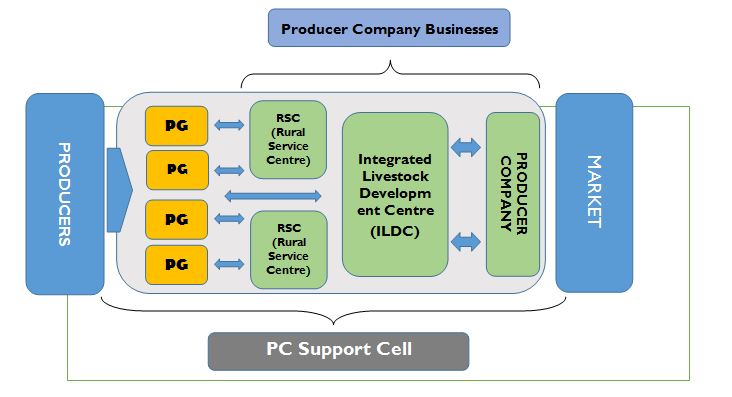PRODUCER ORGANIZATION & PRODUCER GROUP
The MKSP has a mandate of creating community-led institutions which works on the
livelihood and market domain. There has been community institutions in the NRLM
project but their focus has more been in social welfare and community development.
The institutions planned in the project are more specialized in working on production
and business front. The project is promoting Producer Groups (PG) at the village
level which are mainly formed with an intent of developing a business acumen and
bring a business orientation in the current livelihood activities of the PG. The
PGs will range in membership of minimum 25 memberswith a maximum number based on
the interested farmer households who are practicing or are willing to take up the
activity in the village but not exceeding 100-125 per village. The members of these
PGs will be essentially a shareholder of the Farmers Producer Organization (FPO)
preferably under Farmers Producer Company Act, 2002 at the Block or District level.
Till date around 200 Producer Groups engaging more than 8000 producers have been
formed.
These FPOs in order to manage the aggregation, input sale and processing function
will promote business structure called Rural Service Centre (RSC) for the Agriculture
and Minor-forest Produce based commodities. For the livestock where the services
are more important than market access in Jharkhand’s situation, an Integrated Livestock
Development Centre (ILDC) is proposed. This centre apart from selling animal feed
would cater to the preventive veterinary services like vaccination, castration etc
and would coordinate with the relevant agency for the curative services. The diagram
below illustrates the business structures proposed under the project:

The project has around 60000 poor producers under its fold spread in 6 Blocks of
5 Districts of Jharkhand and it is expected that around 60% of the producers may
become a shareholder of the FPO. There is a plan to promote at least 1 FPO per Block
initially. This will generate huge volumes for the FPOs to help them access bigger
markets hence determining better returns. The FPOs initially would deal in multi-subsectors
and may eventually become sub-sector specific depending upon the need. This intervention
is expected to not only build the business skills and institutional capacities of
the producers to operate in the mainstream market but would also create new job
opportunities in the locale.
 Top
Top